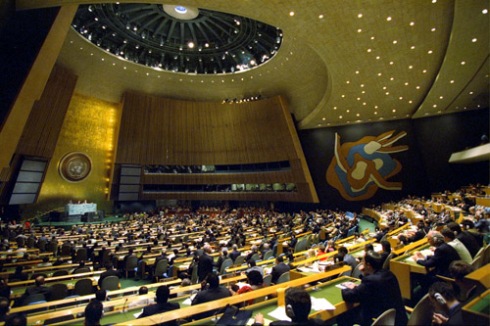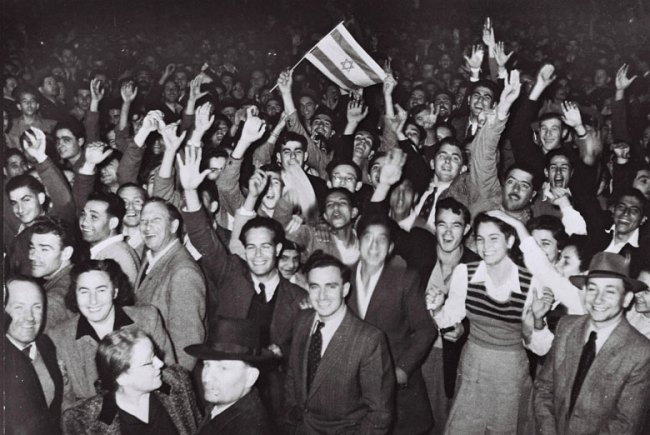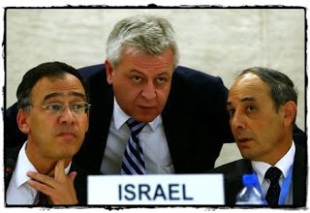In a highly revealing clip, an interpreter at the United Nations was recently caught off-mic expressing disbelief at the UN’s disproportionate focus on Israel, making the point that there ‘so much other stuff going on’ that by comparison gets little attention, if any.
A link to the clip is below, courtesy of the Times of Israel, and I must say I had to smile wearily when I saw it. When I served at the UN General Assembly in 1990 to 1993, as a plenary delegate for Ireland, the bias and obsessive focus on Israel bordered on the ridiculous and farcical, and was of course a wonderfully convenient ‘whipping boy’ from focusing on other embarrassing issues and conflicts. I wrote about all this in my book, An Accidental Diplomat, published in 2001 – relevant extracts below. I also describe the horse trading over human rights resolutions.
But such was the contrived world of diplomacy and multilateral officialdom, that very few really saw fit to speak up about this bias. It was just a given, along with other distortions in the UN, and in the treatment of world affairs. Only an objective observer, such as an interpreter, could the monopolistic focus on Israel as amazing and irritating. It should be said that this bias was not the policy of the actual UN itself, but reflected the agenda of many of its member states. Much has changed in the world since 1990, but clearly this distortion has not. Indeed, looking at the clip here, brings back to me immediately the torpor and robotic pedantry of so much UN ‘debate’ and discussion. I just love the chairwoman’s late announcement that Mauritania and Nigeria, those paragons of human rights, have joined the Israel/Palestine resolution as supporters!
Consistent with Churchill’s maxim that ‘jaw-jaw is better than war-war’, the UN is a very necessary and fine organisation, but much of its discussion and focus is utterly surreal and selective – but again, that is the fault of its constituent parts, the member States. I wrote at length about the UN in my book and was glad that my description of the biased UN focus on Israel was subsequently highlighted by David Harris, of the American Jewish Committee, in his own 2004 book ‘Notes from the Trenches- Selected Speeches and Writings of an American Jewish Activist (link at the end). I am convinced that this early and unfair disproportionate focus on Israel has been utterly counterproductive, and has hardened feelings among Israelis that no matter what they do, they will receive international criticism and so the country may as well as go ahead with controversial policies such as the West Bank settlements. The irony is that the State of Israel was set up by a vote of the UN in 1947, supported by the US and the Soviet Union, in a bi-partisan consensus unheard of in that Cold War era.
Israelis celebrate the 1947 UN vote establishing Israel
Either way, the great compensatory thing for me about the UN being based in New York, by the East River, was that when you went out the door as a visiting delegate, and left behind this distorted, unreal and often immoral atmosphere, you could breathe the clear air again and re-enter the real world of Manhattan.
Link to UN interpreter’s observation:
Extracts from An Accidental Diplomat:
Despite the colourful characters and the often historic speeches, the General Assembly is famous for its boredom. I remember watching John Pilger’s searing TV documentary Cambodia in the Year 10. After the pictures of malnourished children, Pilger damningly showed footage of the General Assembly during the Cambodian debate. ‘And what are the Australian delegation doing during this important debate?’ he asked, sarcastically and the camera would pan to the Australian desk. ‘Oh, they’re reading the newspaper. And the Americans … oh, they’re asleep,’ and the camera would show some bloke nodding off. Pilger was using the delegates’ behaviour as a metaphor for international indifference on Cambodia.
I shared his outrage until I went to sit in the GA for three sessions. The Cambodian debate lasted for about eight hours, with dozens of countries trooping up to express the pious hope that the relevant parties in Cambodia could negotiate a settlement. Who could blame the Australians for pulling out the crossword? (Or the New Zealand delegates for drawing up their All-Time Best Cricket 15?) Besides the Cambodian debate was riven with hypocrisy, for it was the bizarre ‘even-handedness’ of the UN which had sustained the Khmer Rouge as a negotiating force in Cambodian politics and resulted in that country’s seat being left empty. But only a few brave countries were prepared to address this in their speeches.
One time, I was chatting to the Liechtenstein delegate when a Kuwaiti turned around and glared at me; we were ‘talking’ during the Palestine debate. His reaction was nonsensical given that some delegates practically gave each other high-fives during serious debates and the hugging and kissing Central Americans fell upon each other in a Latin frenzy whenever they met in the aisles. No, this was just Kuwait ‘getting back to normal’. After the Gulf War, when the Kuwaitis had got their country back, and killed thousands of Palestinians in the process, they wanted to show that they were back ‘being concerned’ about Palestine again, just like the rest of the Arab world.
In fact, the Palestine debate takes up to three days; ‘debate’ being a rather glorious name for a series of almost identical statements attacking Israel which, ironically, they do not recognise as actually being in the chamber. And if that is not enough, there are three more General Assembly debates on Israel. The issue of Palestine takes up to 20% of the GA’s time, while the situation of the Kurds, for example, gets none. No wonder Ed Koch, Mayor of New York wanted the UN moved out of the city, especially when it passed the infamous ‘Zionism is Racism’ resolution (reversed in 1993).
And, whatever about Cambodia, the Palestine debate is surely the pinnacle of hypocrisy. For the Gulf States in particular, the Palestinians are a useful political football. They bleat on about the issue and yet their own record on the Palestinians is appalling; refusing them citizenship, keeping them in refugee camps so as to sustain the problem and regarding them as a radicalised threat to their own oligarchical regimes. It comes as no surprise to hear that most of the funding for UNRWA and other Palestinian support agencies came not from the rich Gulf States but from the EU.
Some of the accusations were rich indeed. We had Mauritania, which had legalised slavery, attacking Western countries for their treatment of refugees. Or Iran talking about the Group Areas Act in apartheid South Africa — this from a theocracy which had executed thousands. The South African issue was particularly rich in hypocrisy; indeed when Mandela was released and a commitment to free elections made there was almost a sense of disappointment and even panic on the part of some nations. ‘Jaysus, he sounds worried,’ said Napoleon, listening to one of the African speakers. Not only would the age-old whipping boy be gone, but a new South Africa would be an indictment to the corruption and division in the rest of the region.
It was particularly important to have someone else’s problem to point at, especially if the problem was the West’s. Nor need there be any sense of proportion. ‘Hey, it’s like the 1930s again,’ said the jolly Guatemalan obscurely one morning, ‘we should all be wearing those little hats!’ I had no idea what he was talking about until I realised he was referring to the racist attacks in Europe, and particularly in Germany, which the New York Times was predictably comparing to the 1930s. The NYT gave the issue wide coverage and, even within the cocoon of the UN, it showed the vice-like grip of that paper on the city’s middle-class chatter. ( Later, at downtown parties I would hear whole chunks of NYT coverage and opinion coming back at me over a cocktail glass.)
Of course, the racist attacks in Europe were appalling but it seemed strange to get a ribbing about it from the delegate of Guatemala, which had tortured and killed thousands of its own people. But that didn’t matter. What was important was that it was ‘making the news’. Ha, ha, you’re on the front page. In his speech to the General Assembly, the German Foreign Minister, Klaus Kinkel, recognised this and forcefully listed the huge numbers of immigrants then entering Germany, numbers which would put the rest of Europe, including Ireland, to shame
……….
Horse trading on Human Rights
Later, when the GA wasn’t in session, I helped out on the Committees, where the hypocrisy was even worse. The Third Committee dealt with Human Rights, but the whole basis of the Committee was bargaining over language. Because consensus was needed, resolutions would get watered down to nothing, just like at the CSCE, except, instead of thirty-five countries, you now had the whole world putting its oar in.
Suffice to say that half the countries in the room didn’t really appreciate the concept of human rights and found the Western preoccupation with the idea quaint and worthy. Countries like Iran and Indonesia just didn’t understand why a Government would want to give up the idea of having a controlled press and the right to throw people into jail when it wished. Indeed, they found it almost decadent that a Government would abandon such responsibilities.
Instead, they would use the old Soviet-bloc trick of talking about Social Order and Economic and Social Rights, which are not really rights at all. In fairness, they really believed in these concepts. It’s okay for you, they’d say, to talk about people having ‘uncensored access to computers’, but we’d like to get computers for our people in the first place. The West already had most of the world’s resources — in 1990 it was about to launch a war to secure its oil supply — and with such luxuries they could afford to sit back and lecture others on the rights of free association and assembly. Our people are so hungry, one delegate said, that if we let them demonstrate freely, they’d pull down the Government!
There was so much horse-trading about resolutions at the Third Committee that there was a continuous hubbub at the back of the room, which delegates from other Committees found intriguing. People were constantly getting up out of their seats and making hand signals to draw each other away for quick consultations. It was like the Ballinasloe Horse Fair except instead of brown mares and ponies, it was Draft Resolutions (DRs) on Cambodia or Eastern Europe.
It is the sort of culture which suits gregariousness and personal relations and I am convinced that this is why the Cubans had the extraordinarily high profile they did. Of course, it was their mission to use the UN as much as possible, as it was for all the Communist countries — making hay while the Americans and others arrogantly ignored it — and they were constantly on the move, cajoling and persuading whereas the more wooden North Europeans would sit there silently, wondering why support for their resolutions was being eaten away. The other interesting thing was the degree of respect the Cubans got from other South American countries, even the right-wing ones. Geographical and ethnic loyalty transcended ideology. The Cubans were sticking it to the gringos and the other Latins respected them for it.
By contrast, the Western leaders, the Americans and the British seemed to have no sensitivity at times. From bitter experience, the Americans had learned to carry a big stick and speak quietly but the British seemed to speak loudly and carry no stick at all. It always amazed me how unreflective the British diplomats were of the British people and culture I knew and liked. They were to a man “clubbable” Sandhurst types, white and male, with an air of academic disarray, a bookish doggedness, with which they looked down their noses at everybody.
They would constantly intervene in debates with the most pedantic and arrogant of observations — it was a sort of ‘we’re on the look-out for you UN types, don’t you worry’. They also had a really annoying habit of often waiting until the last minute, just before an item vote, and then voicing objections. They did this in the General Assembly and it pissed off everybody. The behaviour of such individuals affects how a country is perceived. There is, after all, an art to diplomacy, but the British didn’t care. Neither did they seem to realise that their methods were doing the very opposite to what was intended, and losing them support.
Before a DR can be canvassed around the floor, cosponsors for the resolution have to be assembled and a draft agreed, usually on the basis of language suggested by the lead country. Once the DR is circulated, other states can join in and co-sponsor, as they wish, or they can drop out. With the draft in circulation, a related battle ensues for its language to be toughened or watered down. The country which is the subject of the DR will obviously be alert and will canvass against it, or better still, get other countries to do so. Sometimes the connection between the subject country and the countries working on its behalf can be tenuous and unexpected.
In the case of the EU and like-minded States, the lead country initiating the DR language, was the Presidency, which in Autumn 1990 was Italy, and at one stage we had great difficulty getting a DR on the human rights situation in Iran. At an upstairs meeting, the young Italian who chaired the meeting was perspiring and had loosened his tie, a rare fashion faux pas for an Italian diplomat. He was obviously under a lot of pressure. It was clear that, behind the scenes, the Iranians were leaning on the Italians to water down the DR, if not withdraw it altogether. The situation was made more difficult by the fact that the DR was based on the report of the Special Rapporteur (SR) of the UN who had visited Iran and made a fairly damning report. There were now suggestions that the SR may have gone too far, or ‘beyond his brief’ as it was put, a charge that drew great umbrage from the British and Dutch who wanted to get tough on Iran.
Words were haggled over and phrases bandied to and fro, with delegates saying they would have leave the room to get new instructions. Almost all the discussion was in English — the French attempts to have it fifty-fifty at EU meetings was a losing battle — and since I was one of only two delegates with English as a first language, I kept getting asked for new and more precise phrasing. One of the words the Italians wanted to change was a reference to ‘accounts’ of atrocities which they regarded as too strong, but the Dutch thought that the replacement of ‘rumours’ was too weak — it almost made the SR’s sources sound like speculative gossip. I suggested ‘reports’ which was gratefully seized on.
‘Ah, yes, reports. Reports is the one,’ said the Spaniard, ‘this way it can be either true or untrue!’ But I don’t think that was the SR’s point.
At least this resolution was eventually passed. The one on Myanmar collapsed, much to the embarrassment of its Swedish initiators and other like-minded countries, including most of the EU.
………….
After the Gulf war of 1990, the Arab world ( and the UN) got back to attacking Israel
Once the embarrassment of Iraq’s invasion [of Kuwait, 1990] went away, the Gulf States went back to their traditional preoccupations, including the Palestinians, for whom they could never protest enough. But not before the Kuwaitis dished out their own punishment to the Palestinians living amongst them, killing more Palestinians in two months than Israel killed in four years of the Intifada. It was a massacre about which the Gulf States, and the UN, barely raised a murmur. Admittedly, the killings were because the Palestinians in Kuwait had, in general, backed the invading Iraqis, but given the manner of the revenge, with summary executions and disappearances, one would have thought that the international community might have raised a protest, especially since it had just fought a war there. But, instead, it said nothing. The following year, having washed the blood out of its execution halls, the Kuwaitis went back to denouncing Israel’s treatment of the Palestinians. Hypocrisy, indeed. As our Political Director had predicted, working at the UN demanded a strong stomach
………..
Link to David Harris book Notes from the Trenches :





